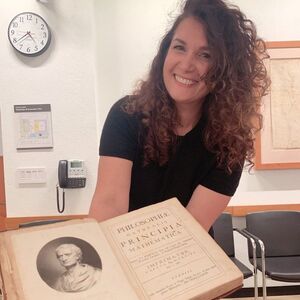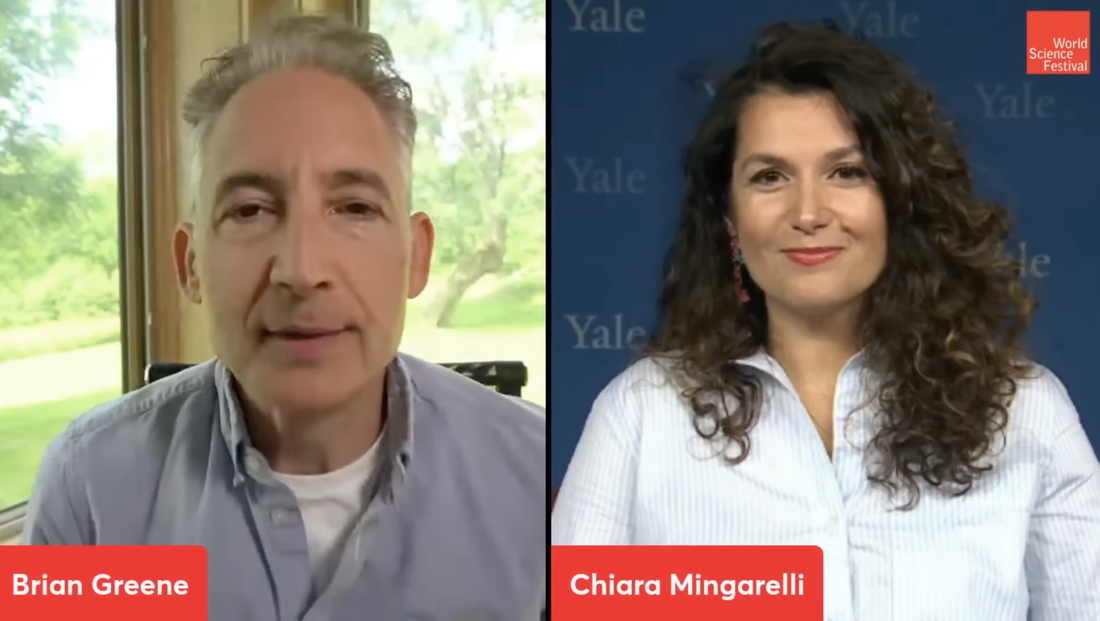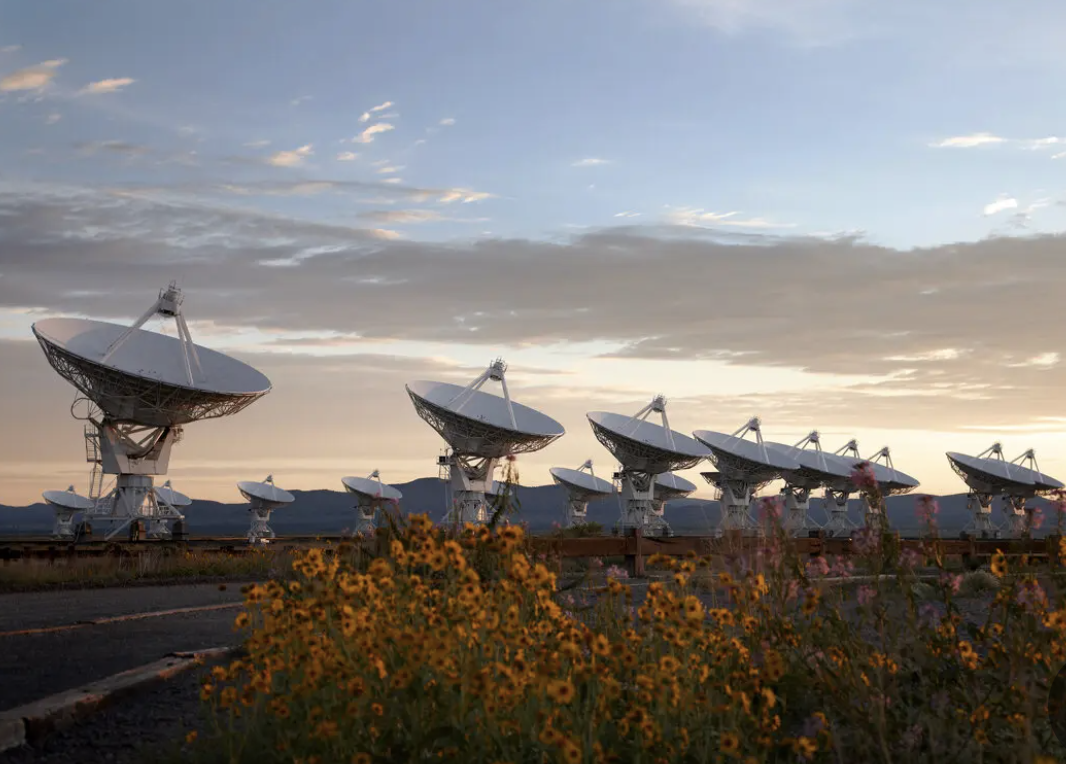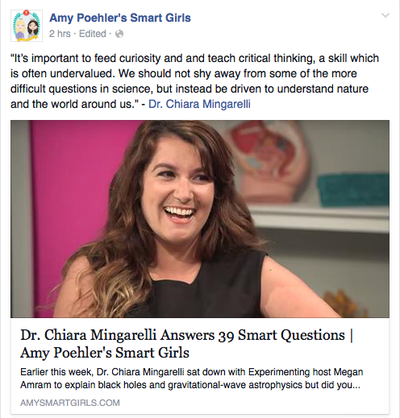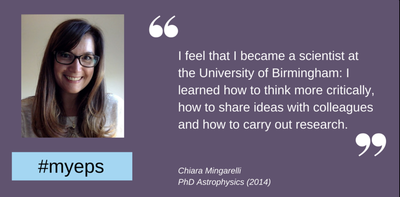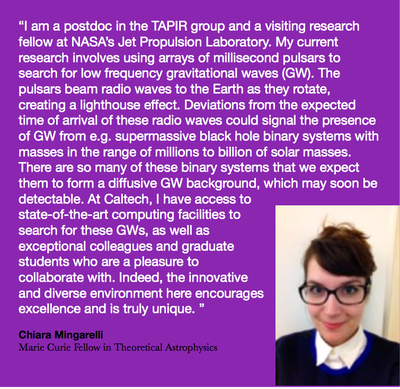Interviews +
Chiara Mingarelli featured in Nature News
|
Five new ways to catch gravitational waves — and the secrets they’ll reveal - 27 June 2024
Observatories, experiments and techniques are being developed to spot ripples in space-time at frequencies that currently can’t be detected. In September 2015, a vibration lasting just one-fifth of a second changed the history of physics. It was the first direct detection of gravitational waves — perturbations in the geometry of space-time that move across the Universe at the speed of light. READ MORE HERE |
Chiara Mingarelli wins the MCAA Career Award 2023
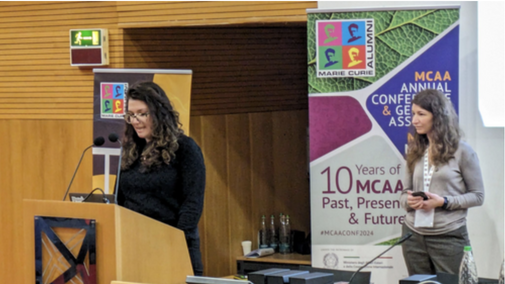
Chiara Mingarelli, assistant professor of physics, has been chosen as the recipient of the Marie Curie Alumni Association (MCAA) Career Award 2023.
The MCAA Career Award recognizes a member’s career achievements, including scientific excellence, outstanding work/research experience, and quality and impact on the community. The award was presented at the Annual Conference and General Assembly held March 14-16, 2024, in Milan, Italy. Mingarelli is the first MCAA Career Award recipient from any institute in North America. READ MORE HERE
The MCAA Career Award recognizes a member’s career achievements, including scientific excellence, outstanding work/research experience, and quality and impact on the community. The award was presented at the Annual Conference and General Assembly held March 14-16, 2024, in Milan, Italy. Mingarelli is the first MCAA Career Award recipient from any institute in North America. READ MORE HERE
The black hole revolution needs you!
OpEd in Nature Astronomy (Nov 2023)

The Nobel Prize for Physics was recently awarded for the generation of attosecond pulses of light. As an expert on black holes, I would have loved to see someone from my field awarded, but black hole research has already won the Nobel Prize for Physics twice in the past seven years. In fact, we are living through a black hole revolution, which started with a bang in 2015.
This bang came from two merging black holes, each one 30 times the mass of the Sun. The bang was found by a gravitational wave (GW) detector called LIGO. Before the LIGO detection, almost 40 years of searching yielded no GWs. Now, LIGO and its Italian counterpart, Virgo, have 90 confirmed GW detections. READ More
This bang came from two merging black holes, each one 30 times the mass of the Sun. The bang was found by a gravitational wave (GW) detector called LIGO. Before the LIGO detection, almost 40 years of searching yielded no GWs. Now, LIGO and its Italian counterpart, Virgo, have 90 confirmed GW detections. READ More
Reaching across the centuries, these seminal science books speak volumes
|
I was delighted to organize a trip to the Beinecke Library at Yale for my students on October 6, 2023. There they touched, held, and interacted with 1st editions of Newton's Principia, books by Kepler, Brahe, Cassini, Maxwell, Faraday.... it was amazing. What a dream come true to have a library with such amazing books!
Here is a short story that YaleNews put together about this pop-up event, and a photo of me holding Principia. news.yale.edu/2023/10/23/reaching-across-centuries-these-seminal-science-books-speak-volumes |
Gravitational Waves and the Dark Universe
|
From the World Science Festival, join us to explore hot-off-the press results in gravitational waves and a just-launched mission promising to shed light on the dark universe. Brian Greene in live conversation with Chiara Mingarelli and Jason Rhodes. Watch the full interview here.
|
The New York Times: The Cosmos Is Thrumming With Gravitational Waves, Astronomers Find
|
By Katrina Miller a science reporter, recently earned a Ph.D. in particle physics from the University of Chicago.
June 28, 2023 Radio telescopes around the world picked up a telltale hum reverberating across the cosmos, most likely from supermassive black holes merging in the early universe. On Wednesday evening, an international consortium of research collaborations revealed compelling evidence for the existence of a low-pitch hum of gravitational waves reverberating across the universe. The scientists strongly suspect that these gravitational waves are the collective echo of pairs of supermassive black holes — thousands of them, some as massive as a billion suns, sitting at the hearts of ancient galaxies up to 10 billion light-years away — as they slowly merge and generate ripples in space-time. Read the full article here. |
The Washington Post: Scientists have finally 'heard' the chorus of gravitational waves that ripple through the universe
|
By Maddie Burakoff | AP
June 28, 2023 NEW YORK — Scientists have observed for the first time the faint ripples caused by the motion of black holes that are gently stretching and squeezing everything in the universe. They reported Wednesday that they were able to “hear” what are called low-frequency gravitational waves — changes in the fabric of the universe that are created by huge objects moving around and colliding in space. Read the full article here. |
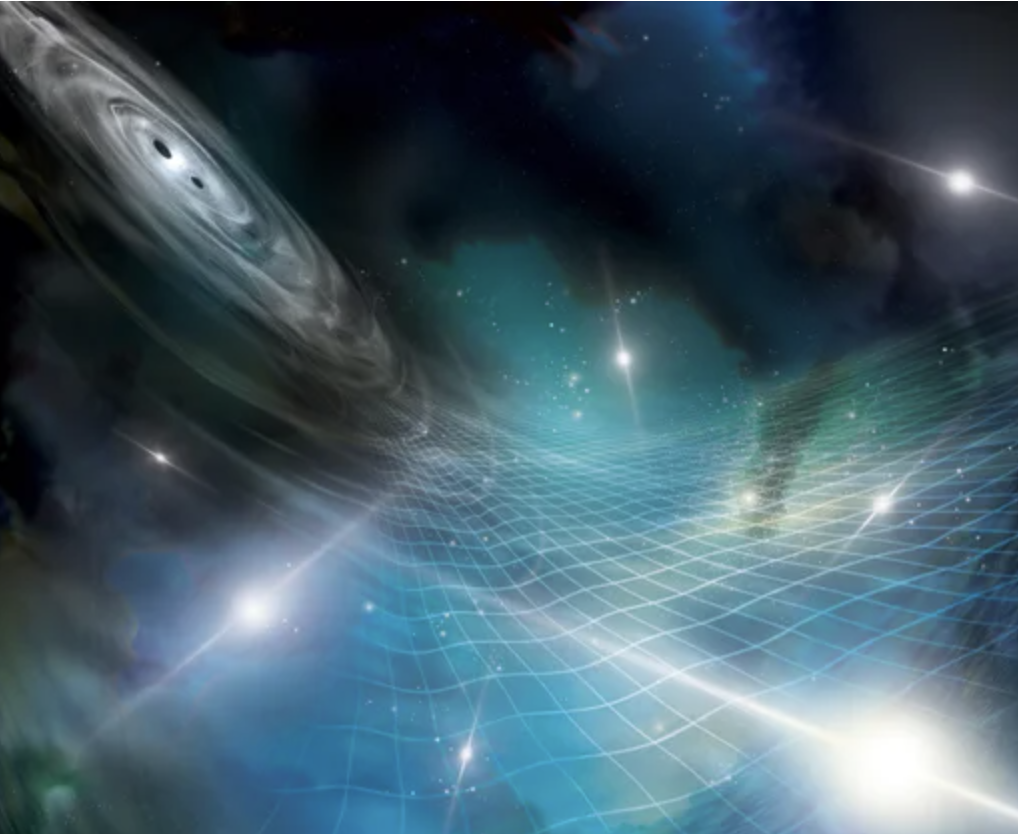
|
Scientific American: First Evidence of Giant Gravitational Waves Thrills Astronomers
|
Astrophysicists are tuning in to a never-before-seen type of gravitational wave spawned by pairs of supermassive black holes
By Meghan Bartels on June 28, 2023 After nearly two decades of listening, astronomers are finally starting to “hear” the rumbles of gravitational waves they believe emanate from the behemoths of our universe: supermassive black holes. The result comes from a National Science Foundation–sponsored initiative known as the North American Nanohertz Observatory for Gravitational Waves (NANOGrav). Since 2004 NANOGrav has monitored metronomelike flashes of light from a Milky Way–spanning network of dead stars known as pulsars. Read the full article here. |

|
The Washington Post: In a major discovery, scientists say space-time churns like a choppy sea
|
The mind-bending finding suggests that everything around us is constantly being roiled by low-frequency gravitational waves
By Joel Achenbach and Victoria Jaggard June 28, 2023 The very fabric of the cosmos is constantly being roiled and rumpled all around us, according to multiple international teams of scientists that have independently found compelling evidence for long-theorized space-time waves. Read the full article here |
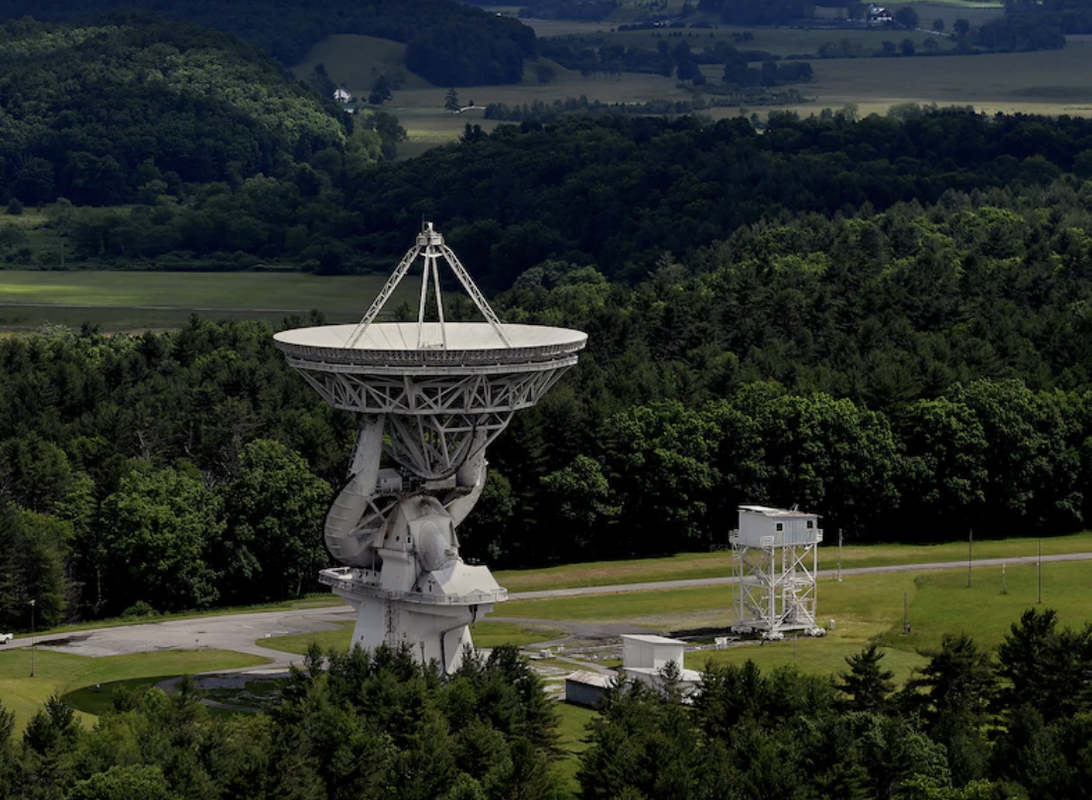
|
NAUTILUS: A Supermassive Test for Einstein’s Famous Theory
|
How a gravitational wave background re-opens the book on general relativity.
BY MELIZE FERRUS & CHIARA MINGARELLI June 22, 2023 You’re oscillating. Well, technically, not just you. We are all being stretched and squeezed by an event we can’t see—at least not with the naked eye. Imagine that throughout the day we have imperceivable fluctuations in our height, starting taller in the day, shorter at night, constantly stretching and squeezing like a spring. Our entire universe experiences something of the same, just rather than fluctuations repeating every 24 hours or so, it’s every decade. Read the full article here |
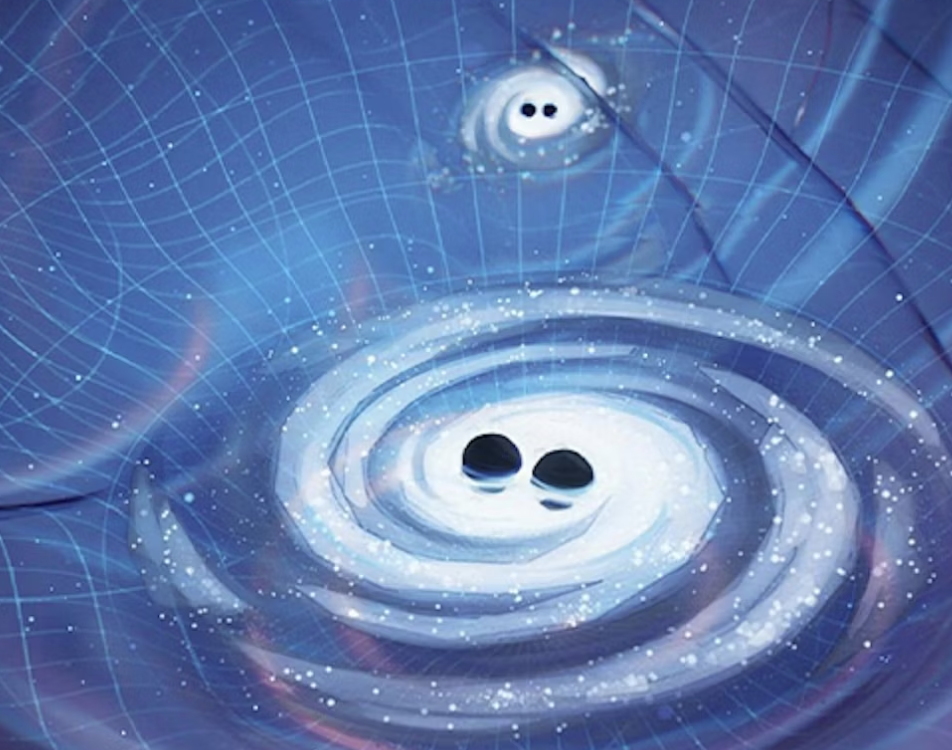
|
The New York Times: Scientists Chirp Excitedly for LIGO, Gravitational Waves and Einstein
|
There was a social media storm which led up to and included the announcement of the first direct detection of gravitational waves.
This excitement caused many physicists to "chirp" for LIGO, under the hashtag #chirpforLIGO. The chirping comes from the final part of the black hole binary's coalescence, when the frequency increases dramatically, making this characteristic chirp. My colleagues and I are featured here, chirping for LIGO, in a clip featured in the New York Times. |
|
BBC Stargazing Live on BBC Midlands Today
|
My interview with David Gregory starts at 2:30. I'm also joined by Kat Grover.
|
|
- March 2016: Invited Blog Series for Amy Poehler Smart Girls "Conversations with a Theoretical Astrophysicist"
- August 2015: Q&A to accompany interview by Megan Amram for Amy Poehler Smart Girls
- April 2015: Featured in the University of Birmingham's "Alumni Profiles" (pdf)
- April 2015: Caltech's Astronomy Brochure "The Postdoc Perspective" (page 11, pdf)
- March 2015: Interview by "Occupy Me", a website for career inspiration for women.
- March 2014: Congratulations on my MC IOF from the IoP's Women in Physics Group in their March newsletter (page 3).
- December 2012: College of Engineering and Physics Sciences Newsletter. Feature, page 13-14.
BBC Midlands Today Interview (13/01/2012)
An interview with the BBC WM about the recent Stargazing Event in Victoria Square, 13/01/12, Birmingham. (see 2:32 in the video below)
Social Media Outreach: If We Ran the World (June 2010 - present)

If we ran the world (IFRTW) is an online forum where you can create an "Action Platform" and then break down your ideas into "microactions". Other members can pick these up and do them for you, helping you to complete your action.
My Action Platform is called "Make science accessible to everyone" and was started in June 2010. I currently have 9 "superheroes" who are helping me achieve my goals and 14 microactions have been completed :)
My Action Platform is called "Make science accessible to everyone" and was started in June 2010. I currently have 9 "superheroes" who are helping me achieve my goals and 14 microactions have been completed :)
** this article was, in opinion, ruined by rookie editors who spliced the intro and conclusion paragraph together and cut everything else out. Needless to say this was upsetting.

